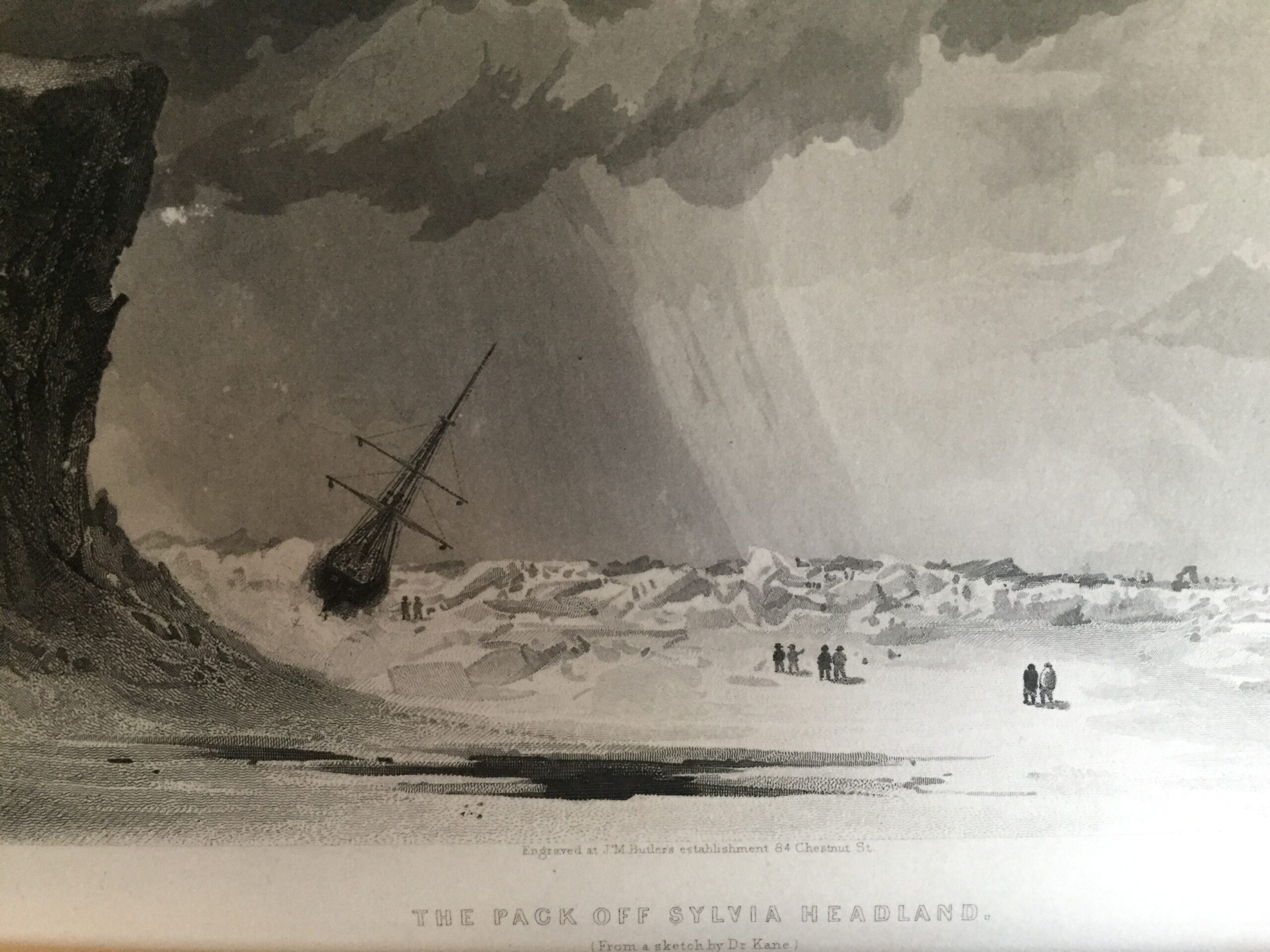Arctic Explorations was commissioned and developed by Nancy Manocherian’s The Cell Theater and New Amsterdam Singers. Its premiere took place on March 9-10, 2024 at the Theater at St. Jean in New York.
CONDUCTOR: Clara Longstreth
CAST (in order of appearance)
Siarnaq: Nuka Alice
Maggie Fox: Nicole Haslett
President Zachary Taylor: Michael Celentano
Lady Jane Franklin: Erin Brittain
Elisha Kent Kane: Colin Levin
HARLEM CHAMBER PLAYERS
Clarinet / Bass Clarinet: Liz Player
Banjo: Zac Larson
Guitars: Justin Rothberg
Violin: Ashley Horne
Viola: Aundrey Mitchell
Double Bass: Anthony Morris
Percussion: Scott Still
PRODUCTION TEAM
Stage Director: Kira Simring
Production Manager: Julian Singer-Corbin
Stage Manager: Richard Urquiza
Lighting Designer: Chris Voegels
Projection Designer: Qixin Zhang
Costumer Designer: Danielle Hartley

from l-r: Kira Simring (Stage Director); Erin Brittain (Lady Jane Franklin); Colin Levin (Elisha Kent Kane); Nicole Haslett (Maggie Fox); Clara Longstreth (Conductor); Michael Dellaira (Composer & Librettist); Nuka Alice (Siarnaq); Michael Celentano (President Taylor);
Arctic Explorations tells the story of 19th century explorer Elisha Kent Kane, and his curious romance with spiritualist and medium Maggie Fox. Opposites in almost every respect, both were American celebrities who entertained crowds: he with tales about glaciers and polar bears, she with messages from the hereafter.
But he was a well-connected navy surgeon from a prominent Philadelphia family while she was an uneducated farm-girl from upstate New York who many considered a huckster, although she counted author James Fenimore Cooper, the Russian emperor Alexander III and abolitionist Sojourner Truth among her patrons.
Arctic Explorations is, then, about the human desire to know what lies beyond the boundaries of our experience. Explorers, all of us, our success often comes at a cost, and nowhere can this cost be measured more than in the Arctic, one of the most beautiful – and endangered – places on earth.
The opera tells how the most famous of the Arctic explorers, British commander Sir John Franklin, in 1845 set sail from Greenhithe, England in search of the fabled Northwest Passage. By 1850, when he hadn’t returned home, he was declared by the Royal navy to have “died in Her Majesty’s service.” In desperation his wife, Lady Jane, wrote to American president Zachary Taylor: The United States is a great power, she said. Wasn’t it as capable laying claim to the Northwest Passage as England might be? And could it not also rescue her husband in the process?
President Taylor turned to Congress, which commissioned Kane. On May 30, 1853, Kane and his crew of 17 pulled up anchor from New York harbor and headed to the Arctic.
Trapped in the ice for two years off the coast of Greenland, Kane and his crew survived not because they brought with them the technology of the modern world (though they did do that), but because they turned to the Inuit for help. This set him apart from the many other Arctic explorers – Franklin included — who, always at their peril and usually to their demise, thought themselves superior to the Inuit.
And as we know, today, because of global warming, the Inuit, who have lived in the Arctic for centuries, are seeing their land disappear. Over 300 billion tons of ice melted from the Humboldt Glacier on a single day last June. This alarming fact is also at the heart of the opera.
I based my libretto on Kane’s 1856 bestseller, Arctic Explorations, as well as letters and newspaper articles from the period, including the love letters between Kane and Fox and the correspondence between Lady Jane Franklin and PresidentTaylor. The Inuit play a significant role in the opera, and the libretto contains a number of passages in the Inuit language Kalaallisut, (now called Greenlandic since Greenland’s independence from Denmark.) To help me with pronunciation and translation, I worked with Greenlandic (and Inuk) drum-dancer Nuka Alice. She has also vetted the libretto to be sure that the nineteenth-century Inuit characters are as true to life as possible.
I scored the opera for five principal singers and chorus, with an ensemble of clarinet, guitar, banjo, violin, viola, double bass and percussion. And since Nuka Alice is a captivating performer, I created a role for her in the opera, that of an Inuk shaman, Siarnaq.
With this opera we hope to illuminate audiences about the Arctic and global warming, to be sure, but also to tell a story about the human need to understand the unknown. That need, after all, is what gave birth to science. But it is also what gives rise to belief in phenomena that are not observable – and also, unfortunately, to superstition, deception and ignorance.
Score and parts available through American Composers Alliance.
With thanks also to Arctic Sounds, Sisimiut, Greenland
ARCTIC EXPLORATIONS is a fiscally sponsored project of the New York Foundation for the Arts and is made possible by the New York State Council on the Arts with the support of the Office of the Governor and the New York State Legislature.
 |
 |


